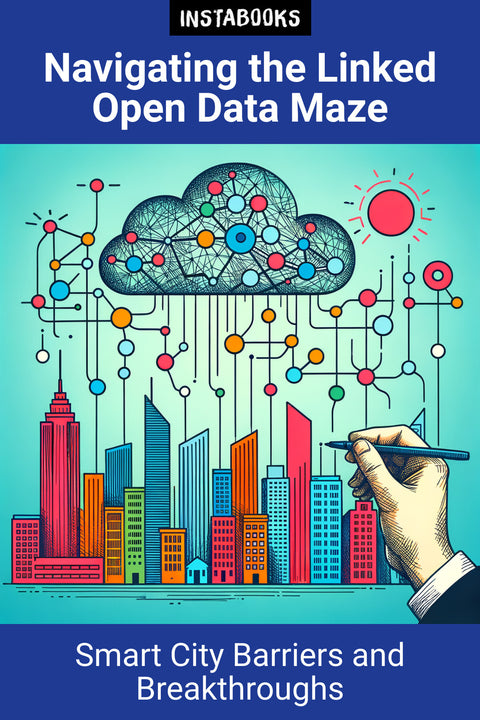
Navigating the Linked Open Data Maze
Smart City Barriers and Breakthroughs
Included:
✓ 200+ Page AI-Generated Book
✓ ePub eBook File — read on Kindle & Apple Books
✓ PDF Print File (Easy Printing)
✓ Word DOCX File (Easy Editing)
✓ Hi-Res Print-Ready Book Cover (No Logo Watermark)
✓ Full Commercial Use Rights — keep 100% of royalties
✓ Publish under your own Author Name
✓ Sell on Amazon KDP, IngramSpark, Lulu, Blurb & Gumroad to millions of readers worldwide
Introduction to Linked Open Data in Smart Cities
In the burgeoning landscape of smart cities, Linked Open Data (LOD) stands as a critical pillar. This book unveils how LOD contributes to the innovative growth of urban environments by supplying data that is accurate, reliable, and ubiquitously available. Yet, the journey is fraught with barriers—standardization gaps, data quality ambiguities, scalability issues, and privacy roadmap. These challenges present formidable hurdles for policymakers, technologists, and city planners. But fear not, as comprehensive research and tested solutions are outlined within these pages to guide you through.
Confronting Key Challenges
Data quality and standardization are paramount for seamless integration and interoperability in smart city systems. This book dives into the core problems of mismatched data standards and the debilitating effects these have on system efficiency. By addressing these issues, we turn the fractured landscape of data management into a unified system capable of driving the smart city vision. Detailed insights into high-performance systems provide a roadmap for scalability and robustness—a necessity to manage the data influx in smart urban areas.
The Need for Transparency and Privacy
Transparency in data handling builds trust among city residents, fostering a community that supports innovation. However, this comes with its own risks in terms of privacy and data security. Learn to navigate these intricacies and discover effective measures to safeguard sensitive information while maintaining openness. You'll explore how transparency policies can be balanced with privacy protocols to craft an ethical and efficient LOD strategy.
Harnessing the Power of Open Source Tools
By engaging open-source tools, urban planners can find cost-effective solutions that resonate with the essential tenets of scalability and maturity. These tools play a crucial role in the publication and consumption of LOD for smart city ecosystems. The book leads you through case studies and real-world applications, like the integration of LOD with public-rental bicycle systems, showcasing how these strategies are realized in practice.
Here and Beyond: Technological Enablers and Research Trends
Explore cutting-edge enablers like IoT and AI that enrich LOD platforms with real-time data inflows and advanced analytics. Furthermore, the collaboration among various stakeholders, a form of collective action, is emphasized as a cornerstone for success. As research trends constantly evolve, they shape the capabilities and limits of what LOD can achieve. Dive into the newest technological advancements driving efficiency and the rapid adoption of LOD in smart city scenarios.
Table of Contents
1. Understanding Linked Open Data- Defining Linked Open Data
- Importance in Smart Cities
- Current Adoption Landscape
2. Challenges in Data Quality and Standardization
- Data Consistency Issues
- Standardization Efforts
- Impact on Smart Cities
3. Scaling Smart City Projects
- Performance and Scalability Needs
- Tools for Large Data Sets
- Real-world Applications
4. Ensuring Transparency and Privacy
- Building Trust with Transparency
- Privacy Measures
- Balancing Openness and Security
5. Leveraging Open Source Tools
- Advantages of Open Source
- Integration Strategies
- Case Studies
6. Utilizing Data Portals
- What Are Data Portals?
- Indexing Datasets
- Enhancing Accessibility
7. Technological Enablers: IoT and AI
- Integration with IoT
- AI for Smart Data Management
- Advanced Analytics Applications
8. Case Study: Public Rental Bicycle System
- Overview of the System
- Integration with LOD
- Outcomes and Learnings
9. Collective Action and Collaboration
- Stakeholder Involvement
- Collaborative Platforms
- Success Stories
10. Research Trends and Innovations
- Recent Technological Advances
- Emerging Best Practices
- Future Directions
11. The Future of Smart City Applications
- Predictions and Possibilities
- Sustainability Goals
- Role of LOD
12. Implementing Linked Open Data Strategies
- Developing Action Plans
- Measuring Success
- Adaptive Strategies
Target Audience
This book is designed for urban planners, technology enthusiasts, data scientists, and policymakers interested in leveraging Linked Open Data for smart city development.
Key Takeaways
- Understand the role of Linked Open Data in smart cities.
- Identify barriers like data quality, scalability, and privacy.
- Explore solutions using open-source tools and data portals.
- Learn about technological enablers such as IoT and AI.
- Gain insights from real-world case studies.
- Stay updated on research trends and future prospects.
